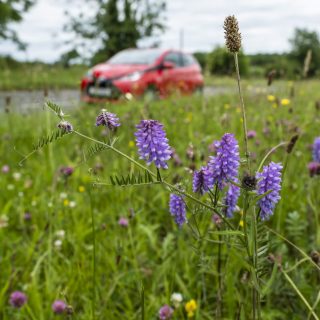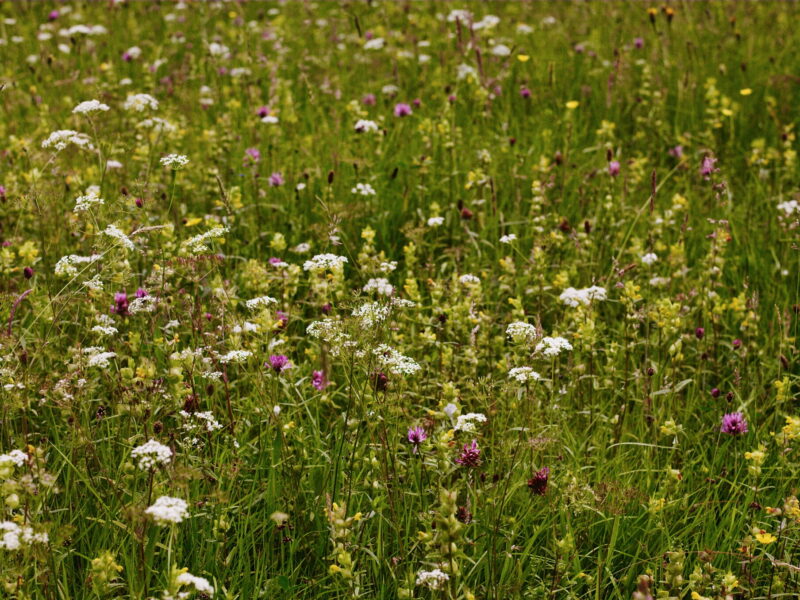Life on the Edge: creating and managing wildlife-friendly verges
- Date: 14 April 2021
- Time: 7pm
- Address: Online
Our roadside verges are some of the treasures of Devon. They can be a riot of colour, spilling over with flowers and rich with wildlife. There is immense potential for managing more of them for nature and for people. Discover the exciting possibilities by joining us for an evening of two inspiring talks, followed by a Q&A session.
Register for the talk here.
Did you know that nearly half of the UK’s wildflower species grow in verges? That roadside spaces are refuges for many rare meadow wildflowers that have vanished from elsewhere in the landscape? Roadside verges cover a huge area in the UK and they are increasingly important in providing habitat for threatened wildlife, from insects to birds, mammals large and small, reptiles and amphibians.
Join national and county road verge specialists, Dr Kate Petty, Plantlife’s Road Verge Campaign Manager, and Leo Gubert, senior ecologist at Highways England South West, for an evening of two inspirational talks. They will tell us how they are restoring verges to flower-rich meadows and creating wildlife corridors, illustrated with some of the best examples from across the country. Kate will discuss how Plantlife are inspiring both parish councils and community groups to get involved in restoring this nationally important habitat.
Since 2015, every Parish Council in Devon has the opportunity to take on the responsibility for managing its road verges from Devon County Council. Due to budget cuts, Devon County Council stopped managing roadside verges, including previously designated ‘special verges’, where speed limits are 40mph and below, except for areas where visibility is compromised. Some Town and Parish Councils have taken on the responsibility for managing their own verges but the majority have not. If wildlife is to thrive again, we need to create and restore a network of biodiverse habitats across the country, including restoring and creating wildflower meadows on appropriate roadside verges.
Our two speakers will be joined by Devon County Council ecologist Mike Waller who will outline the support that Devon County Council can offer community groups, parish and town councils, enabling them to transform their local verges into wildlife havens. Mike is a botanist with a particular interest in wild orchids. He has previously worked for Plantlife, London Wildlife Trust and the RSPB.
Dr Kate Petty is Plantlife’s Road Verge Campaign Manager working with Councils, community groups, contractors, and statutory and highways agencies to see road verges better managed for wildflowers and the wildlife they support. Kate will explore the importance of road verge habitats and take you on a whistle-stop tour of Plantlife’s management guidance, sharing inspiring case studies from successful projects across the country.
Leo Gubert is Highways England’s senior ecologist in the South West. His talk provides a fascinating insight into the habitat restoration work of Highways England, along Devon’s A38 and other high-speed roads. Discover how a tapestry of flower-rich verges has been created, as well as other valuable wildlife habitats, providing a refuge for species no longer able to survive elsewhere.
Imagine if there was at least one special verge in every Devon town or parish that was managed for its wild plants and wildlife, what a difference that would begin to make.
The talk will be followed by a Question & Answer session.
If you’d like to know more about the value of roadside verges for wildlife and their potential importance in nature’s recovery, and how you and your local council can get involved, then join us on the evening of April 14th to find out more.
Register here.
This talk is free, but if you can afford a donation, between £2.50 and £10, this will go towards supporting the work of Moor Meadows. The group is not-for-profit, run by volunteers and any funds go entirely towards providing events with top speakers and helping with the running costs of our website and forum.

Other events

Open Meadows 2025
18 May 2025 to 1 September 2025
Open Meadows is a unique opportunity to visit some of Devon’s most beautiful and diverse privately owned meadows. The meadows are open to all during the programme, and the vast majority are free to visit.

The Meadow-Makers’ Conference 2025
12 July 2025
The Meadow Makers’ Conference marks the 10th anniversary of Moor Meadows and brings together landowners, farmers, and gardeners for a day filled with expert talks, inspiring ideas, and practical advice - all within the broader context of nature recovery. The event will take place in the spacious Jubilee Hall in Chagford, Dartmoor. During the breakout sessions, attendees will have the opportunity to visit several nearby meadows. We have a fantastic lineup of speakers - see the inspiring programme and more details here.
